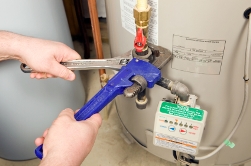Things to Ask Plumber Training Schools

Now that you have decided to earn a diploma, certificate or degree, you can start to narrow down your training options. Since there are numerous plumbing vocational and trade schools in the Post Falls ID area, it's important to have a checklist of qualifications that each school must satisfy. The first 2 that we talked about were location and the cost of tuition. And while both qualifiers may be crucial when making your decision, there are additional variables that must be taken into account as well. Following is a checklist of those added qualifications that you will need to research prior to choosing a plumber tech school.
Is the Plumbing School Accredited? A large number of plumbing trade schools have received either a regional or a national accreditation. They can acquire Institutional Accreditation, which involves the school's programs as a whole, or Programmatic Accreditation, which pertains to an individual program, such as electrical technology. Make sure that the Post Falls ID program is accredited by a U.S. Department of Education recognized accrediting organization, for instance the Accreditation Board for Engineering and Technology. In addition to helping ensure that you receive a quality education, it may assist in obtaining financial assistance or student loans, which are frequently unavailable for non-accredited schools. Furthermore, a number of states require that the plumbing training course be accredited in order to be approved for licensing or certification.
Is the Plumbing School Licensed? Along with accreditation, an additional way of confirming that a trade school you’re considering is reputable is by checking that it’s properly licensed. Licensing is typically controlled and regulated by state agencies, such as the Idaho Department of Education. If you’re not sure, ask the school which state agency is responsible for its licensing and then check to ensure that it’s up to date.
How Long has the School been in Business? Another means of determining the quality of a technical school is to find out how long it’s been in business. The longer a school has been in operation, the more likely that its programs are highly rated and regarded. Conversely, schools that are not well regarded or that provide low quality training generally don’t stand the test of time. However, keep in mind that even the best of Post Falls ID schools had to start from their first day of operation, so only use it as one of several qualifications for each school you are considering.
What are the School’s Completion and Placement Rates? Ask the plumbing training programs you are reviewing what their completion rates are. The completion rate is the portion or percentage of students who enroll in and complete the program. A lower completion rate might signify that students were unhappy with the course and quit. It may also signify that the teachers were not qualified to instruct the students. It's similarly important that the schools have high job placement rates. Older and/or more reputable schools may have a more extensive list of graduates, which may result in more contacts for the school to utilize for their apprenticeship and job placement programs. A high job placement rate will not only validate that the school has a good reputation within the trade, but additionally that it has the network of contacts to assist students secure apprenticeships or jobs in the Post Falls ID area.
Are Apprenticeship Programs Sponsored? Most plumber trade programs are taught in conjunction with an apprenticeship or an internship program. Those participating vocational and technical programs will help place you in an apprenticeship program inside their network of plumbing contractors or labor unions. Find out if the schools you are reviewing have working relationships with local Post Falls ID plumbers or plumbing specialists. An apprenticeship not only provides a valuable experience by furnishing practical training, but it also furnishes employment opportunities and helps to form relationships in the area plumbing professional community.
Are there Modern Facilities? Make sure that the campus facilities and the tools that you will be trained on are up-to-date and what you will be using in the field. If you are currently in an internship or an apprenticeship, check with the master plumber you are working with concerning what you should be expecting. Otherwise, ask a local Post Falls ID plumbing contractor if they can provide some pointers.
Where is the School Located? Unless you are willing to move, the school needs to be within driving distance of your Post Falls ID residence. Take note that if you decide to enroll in an out-of-state school, in addition to moving costs there can be higher tuition charges compared to in-state residents.
Are there Smaller Classes? It's desirable that you receive as much individualized instruction as possible, which can be difficult in bigger classes. Ask if you can monitor some of the classes so that you can see how big they are and experience the interaction between students and teachers. Speak with a few of the students and get their comments concerning class sizes and instruction. Finally, speak to some of the instructors and find out what their level of experience is in Post Falls ID and what certifications or degrees they hold.
Is the Class Schedule Convenient? Verify that the class schedules for the schools you are reviewing are flexible enough to meet your needs. If you can only attend classes in the evening or on weekends near Post Falls ID, confirm that the programs you are considering offer those choices. If you can only attend on a part-time basis, make certain that the school you select allows part-time enrollment. Additionally, find out what the protocol is to make-up classes should you miss any because of work, sickness or family emergencies.
